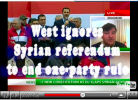 70 per cent of Syrians voted in referendum to end one party rule and to have elections but have been hit by EU sanctions anyway. Aljazeera reported that no-one would vote, but it seems that a lot did. Basically the world is dividing into an Eastern and Western bloc over this, with Russia and China supporting Syria's right to settle its own affairs and the US and other Anglophone western nations and the EU are looking for a pretext to intervene and threatening crippling sanctions. Further down we might expect EU imposition of a no-fly zone to give them an excuse to invade, as has already happened in Libya. Is the end-objective to isolate Iran for its oil reserves? What's up? Here are some views. (Incidentally, a shock inside for Australians - we are 2nd highest ranking weapons importers. What are we doing with them? Are we on-selling? And who's making money out of this?)
70 per cent of Syrians voted in referendum to end one party rule and to have elections but have been hit by EU sanctions anyway. Aljazeera reported that no-one would vote, but it seems that a lot did. Basically the world is dividing into an Eastern and Western bloc over this, with Russia and China supporting Syria's right to settle its own affairs and the US and other Anglophone western nations and the EU are looking for a pretext to intervene and threatening crippling sanctions. Further down we might expect EU imposition of a no-fly zone to give them an excuse to invade, as has already happened in Libya. Is the end-objective to isolate Iran for its oil reserves? What's up? Here are some views. (Incidentally, a shock inside for Australians - we are 2nd highest ranking weapons importers. What are we doing with them? Are we on-selling? And who's making money out of this?)
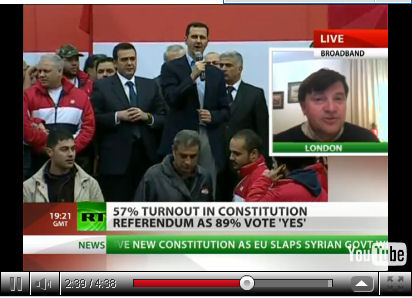
Western leaders ignore majority of Syrians
Republished from "West Regards Majority of Syrians as "Non-People"by grtv"
"Syria has successfully held a referendum on a constitution, but been hit with new sanctions by the EU anyway.
Neil Clark, a journalist and contributor to The Guardian, believes Western leaders are being highly hypocritical when they criticize the Syrian regime for being undemocratic, and yet fail to respect the views of the majority of Syrians.
“Fifty-seven per cent of Syrians have voted and an overwhelming majority of them have said yes to it,” he told RT “It’s a great day for democracy in Syria. And yet what’s the reaction been by the Western leaders? Well, Hillary Clinton denounced it as a cynical ploy. Guido Westerwelle, the German foreign minister, said that it was a sham, but in fact what is a sham is the West’s approach because the reaction to this referendum shows us that they’re not really keen on democracy in Syria.”
Clark said the West tends to cast a blind eye on huge pro-Assad demonstrations and the fact that 55 per cent of Syrians want President Assad to stay.
“The reality is that the majority of Syrians support Assad, but for the West these are non-people, their views don’t count”.
He noted the symbolism of the announcement of new sanctions against Syria by the EU.
“On the very day that Syria, after five decades of one-party rule, votes for democracy, what does the EU do? It announces tough new sanctions on Syria. It’s highly symbolic.”
Clark expressed his opinion that the EU was hardly a democratic body itself.
“I think that it’s quite ironic on this very day we also have the French President Nicolas Sarkozy explaining why we, the European people, are not going to be allowed to vote ourselves on the EU fiscal treaty. He says it’s too hard for us to understand. So the EU, which is claiming to be in favor of democracy, is actually working against it.”
He concluded by saying that the majority of Syrians do not want their country to disintegrate like Iraq or Libya and see President Assad and the Ba’ath party as the preferred solution to hold the country together."
The Manila Times on Friday 17 February gave details of the referendum before it was voted on and treated the matter with less optimism:
A day after rejecting United Nations (UN) allegations of crimes against humanity, the Syrian leader set the referendum for February 26, in a move aimed at placating growing global outrage over the bloodshed.
The proposed charter drops Article 8, which declared the ruling Baath Party as the “leader of the state and society,” allowing for a multi-party system, state television said.
The president must be a Muslim man and may serve a maximum of two seven-year terms, although it is unclear if this would apply to Assad, who is already on his second term.
In April, Assad scrapped emergency rule—in force since 1963—when the Baathists took power in a coup d’etat. But he has repeatedly promised reforms that have failed to materialize since the uprising erupted in March.
The embattled 46-year-old president, who succeeded his late father Hafez in 2000, said that the Constitution would usher in a “new era” for Syria, the state-run Syrian Arab News Agency reported.
Meanwhile, the Anarchist Weekly gives this opinion:
"Syria Bleeding"
"The butcher Assad, the so called President of Syria, has made his name by butchering his own people, not by invading Israel. Assad and the reactionary Israel government are two peas in the same pod. Violence is their stock in trade. Murder and destruction is their legacy. Human beings are mere objects to be prodded, gutted, slaughtered for the glory of the state.
These modern day Aztec Priests don’t even use the fig leaf of religious belief to justify their atrocities. Syria is a classical example of what happens when rulers who are faced with peaceful protest use their monopoly on the use of force to derail that protest. The world looks on while the autocrats in China and Russia block United Nations intervention in Syria and the United States uses the Arab League to try to unseat an autocrat they don’t control to insert one they do control.
The people of Syria in 2012, like the people of Spain in 1936, need the help of ordinary people to halt these atrocities. More so than ever before they need to see the very soldiers who are involved in the slaughter turn their guns against their officers. These Syrian soldiers, as many before them have done, need to use the arms they have brought to the struggle to protect Syrians who have used their bare hands to dismantle a regime that has a track record of brutality that is only matched by the Israeli states’ treatment of Palestinians in the Gaza Strip and the West Bank."
Candobetter Peak Oil Politics author view:
Our resident Peak Oil Politics writer, Sheila Newman, said:
"Since the establishment of the Anglo-Persian oil company in Iran, and the dismantlement of the Ottoman empire during the First World War, Western industrial interests have used governments and warfare to colonise and destabilise the tribes and nation-formation and government of countries in the Middle East (and South America, Asia and Africa) that could possibly have an association with oil. These machinations include the control of countries bordering the oil producers, like Syria (although it does have some oil, important to its economy), Somalia and the Sudan. In 1970, the United States - which had built its modern industrial, military and political strength on its own oil production - became a net oil importer. With the oil shocks of the early 1970s, Arab and other third world oil-producing colonies[1] organised through OPEC (0rganisation of Petroleum Exporting Countries - started by Gadaffi) to become independent and better represent their own interests on the global oil market instead of those of foreign national oil companies and public and private corporations. Australia, under Prime Minister Whitlam almost took this route, when Whitlam's Minister for Minerals and Energy, Rex Connor, nearly made Australia energy-self-sufficient. The Khemlani loan was mostly for that purpose with the ancillary purpose of supporting full employment of Australians during the 1970s oil shock period.
The Eastern bloc took a different route from the capitalist-industrialist bloc, seeking to bring a communist outlook to the oil-producing countries of the world, which would then align them to its philosophy and to its membership countries. Historically communism is a reaction to capitalism.
The Western and Eastern blocs each supplied arms to oil producing countries and those countries became global 'hot-spots'.
Western counter-shocks sought to weaken this alliance by reducing oil-demand, with the intended effect of drastically reducing the incomes of the OPEC members. These actions brought about new negotiated prices in a newly formed global petroleum market. OPEC has continued to hold its own on this market, with the stated purpose of keeping prices relatively smooth and looking after the interests of its members. This approach has probably maintained fairly benign oil-pricing, but the stakes are rising, both for oil exporters and oil importers, who are mutually dependent - one for income and the other for fuel.
The reason that the stakes are rising is because world population and industrial activity is continually breaking its own records and is now completely hooked on the economic growth model, which relies utterly on petroleum supply to survive in current proportions. Obviously both sides of the global oil market - the exporters and the importers - would like to increase the certainty of their positions. For the oil-exporters the way forward must seem to be to diversify their national economies and produce and consume locally whilst conserving their fuel for their own welfare. This may not mean that they would withhold all their petroleum, but it would throw a spanner in world economic growth and cause poverty in previously wealthy countries that have used up much or all of their local fossil fuel supplies. For the oil-importers the way forward must seem to be to get control (as in colonial times) of Middle Eastern oil and use it to prop up their own economies and manufacturing. Quite a few of the oil-producing members of OPEC want to conserve world oil supplies and this flies in the face of many of the oil importing economies' desire to continuously increase population, production of goods, and consumption. These opposite interests can have only two outcomes - warlike competition as the world separates into blocs or world cooperation. World cooperation would require the world to abandon both growth economics, world economic development and the current division of world population into poor commodity-producing economies and wealthy consuming countries. It would also, in my view, require empowering people at a local level in all countries who would then delegate power upwards, instead of the top-down corporate politics that have evolved since the 18th century.
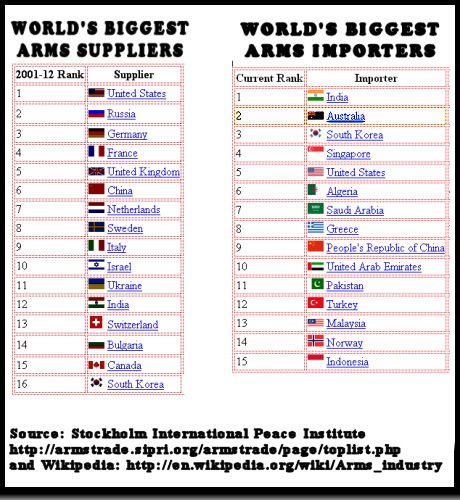
There are other notable sub-interests affected. One of these is weapons production - in which the US and most governments invest heavily. Astonishingly, little Australia is second in world ranking for importing arms! (Candobetter must look into this.)
Another is industries profiting from increasing world immigration as an economic stimulator of development and redevelopment in established industrial economies which would otherwise slow down as their populations stabilised and demand for housing, roads etc diminished. This drive to import people to stimulate growth economies only applies strongly in the Anglophone powers - Western Continental Europe does not have the same reliance on immigration as an economic stimulant. (Australia, Canada, the US, and Britain are well-known for unsustainable population growth in the service of speculative industries known as the Growth Lobby.)
Modern Oil politics and Resource Wars
Greg Muttitt, in his brilliant book, Fuel on the Fire: Oil and Politics in Occupied Iraq, Bodley Head, UK, 2011, p.xxv, writes:
"One of the lessons of this book is that we must revise our notion of a resource war. We have tended to think of the conquistador loading up his ship with stolen New World gold, but a single shipload of any commodity is worth relatively little to a world power, or even to a corporation. A far more valuable prize can be carried in a briefcase or on a laptop computer: contracts, laws and policies that ensure the flow of resources over decades.
It would be wrong to simply equate US and UK energy security with the interests of their corporations. But they do overlap. After all, if those corporations were to gain contracts entitling them to extract more oil, that would help provide the secure, increased supplies their governments seek.
Enforceable rights to extract resources confer not just wealth but power. Less visible than tanks in the streets, the more abstract forms of power asserted through documents and institutions last far longer. The outcome of the oil struggles recounted in these pages will in large part determine the nature of the West's relationship with Iraq and the wider Middle East for decades to come. This book is a warning of the fate that may befall other parts of the world as the competition for resources becomes more intense, if we do not learn form this experience."
What do you think? Please send us your comments.
See also: comment Are we being lied to any less than in 1991, 2003, 2011, ... ? of 5 March - Ed.
[1] "OPEC is an intergovernmental organization of 12 oil-producing countries made up of Algeria, Angola, Ecuador, Iran, Iraq, Kuwait, Libya, Nigeria, Qatar, Saudi Arabia, the United Arab Emirates, and Venezuela. OPEC has maintained its headquarters in Vienna since 1965,[2] and hosts regular meetings among the oil ministers of its Member Countries. Indonesia withdrew in 2008 after it became a net importer of oil, but stated it would likely return if it became a net exporter again." (Wikipedia)


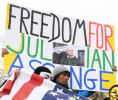 Day four of Julian Assange’s extradition hearing saw lawyers discussing whether international law supersedes English law and a dramatic rejection by the judge of a simple request for Assange to be allowed to sit with his lawyers. [This article first published at
Day four of Julian Assange’s extradition hearing saw lawyers discussing whether international law supersedes English law and a dramatic rejection by the judge of a simple request for Assange to be allowed to sit with his lawyers. [This article first published at 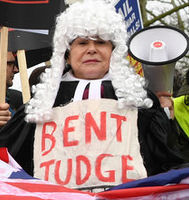
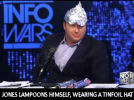
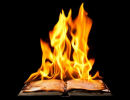 During the 80 years following 1789 that it took for the French Revolution to acheive its aims as the Third Republic, the people of the third estate (that is neither church nor noble) launched many newspapers and founded many societies where they could meet and discuss matters.
During the 80 years following 1789 that it took for the French Revolution to acheive its aims as the Third Republic, the people of the third estate (that is neither church nor noble) launched many newspapers and founded many societies where they could meet and discuss matters.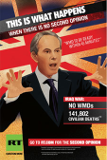

 70 per cent of Syrians voted in referendum to end one party rule and to have elections but have been hit by EU sanctions anyway.
70 per cent of Syrians voted in referendum to end one party rule and to have elections but have been hit by EU sanctions anyway. 

 The problem with Mr Murdoch's newspaper empire is not just unethical behaviour by his journalists. It goes much deeper. With the alarming concentration of media ownership in Australia and the advent of PR driven journalism, for the sake of democracy, the public must support independent media.
The problem with Mr Murdoch's newspaper empire is not just unethical behaviour by his journalists. It goes much deeper. With the alarming concentration of media ownership in Australia and the advent of PR driven journalism, for the sake of democracy, the public must support independent media.  (Image: Rupert Murdoch, courtesy Rex Interstock) Sign this online petition advocating a comprehensive Inquiry into the Australian media industry. #AusPol
(Image: Rupert Murdoch, courtesy Rex Interstock) Sign this online petition advocating a comprehensive Inquiry into the Australian media industry. #AusPol  http://fb.me/18xDXIEuv
http://fb.me/18xDXIEuv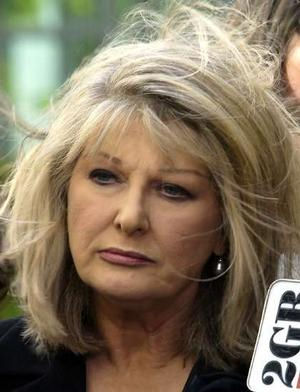
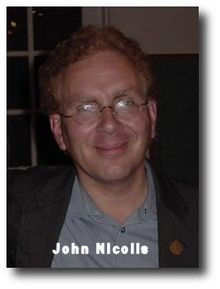 http://en.wikipedia.org/wiki/John_Nichols_%28journalist%29
http://en.wikipedia.org/wiki/John_Nichols_%28journalist%29
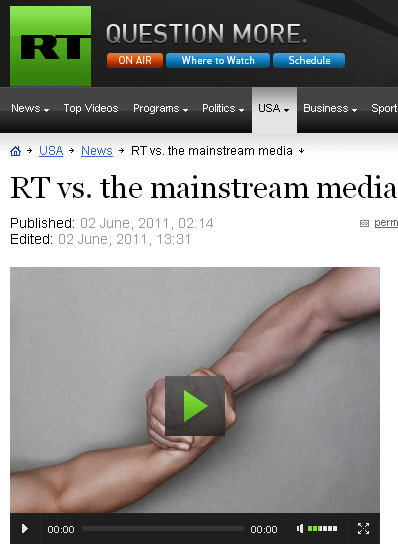
Recent comments